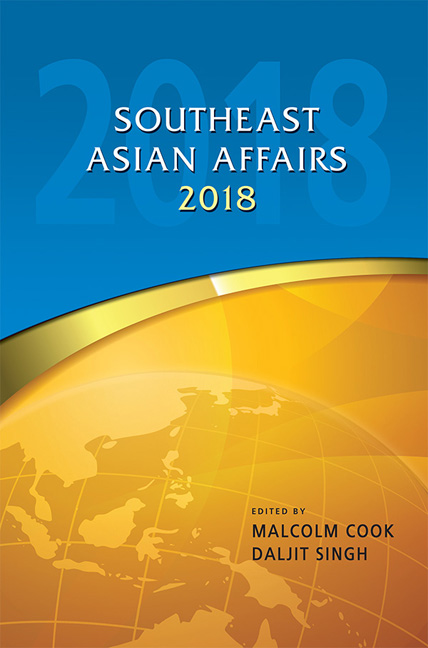Book contents
- Frontmatter
- Contents
- Introduction
- Acknowledgements
- THE REGION
- BRUNEI DARUSSALAM
- CAMBODIA
- INDONESIA
- LAOS
- MALAYSIA
- MYANMAR
- THE PHILIPPINES
- SINGAPORE
- THAILAND
- Thailand in 2017: Stability without Certainties
- Haunted Past, Uncertain Future: The Fragile Transition to Military-Guided Semi-Authoritarianism in Thailand
- Thailand's Southern Insurgency in 2017: Running in Place
- TIMOR-LESTE
- VIETNAM
Haunted Past, Uncertain Future: The Fragile Transition to Military-Guided Semi-Authoritarianism in Thailand
from THAILAND
Published online by Cambridge University Press: 08 June 2019
- Frontmatter
- Contents
- Introduction
- Acknowledgements
- THE REGION
- BRUNEI DARUSSALAM
- CAMBODIA
- INDONESIA
- LAOS
- MALAYSIA
- MYANMAR
- THE PHILIPPINES
- SINGAPORE
- THAILAND
- Thailand in 2017: Stability without Certainties
- Haunted Past, Uncertain Future: The Fragile Transition to Military-Guided Semi-Authoritarianism in Thailand
- Thailand's Southern Insurgency in 2017: Running in Place
- TIMOR-LESTE
- VIETNAM
Summary
The National Council for Peace and Order (NCPO) junta led by General Prayuth Chan-ocha came to power on 22 May 2014 after it toppled the elected government of Yingluck Shinawatra, sister of former prime minister Thaksin. This coup returned Thailand to military authoritarian rule similar to that of strongman Field Marshall Sarit Thanarat's in the late 1950s and early 1960s. Prayuth's premiership brought back the old model of “Thai-style democracy” in which the royal–military alliance dominates politics with an ultra-conservative discourse. Since the coup, the military has established itself as the new ruling elite by enhancing its scope of power, budget and size. It has also sought to maintain its dominance by weakening majoritarian democracy and undermining the influence of political parties and civil society through constitutional design. This chapter explains an attempt of the Prayuth administration at restructuring Thai political order through various institutional mechanisms in order to prolong military power.
During the Cold War period, military rule was the most common form of non-democratic regime. Between the end of the Second World War and the beginnings of the third wave of democratization, militaries have intervened in approximately two-thirds of the more than one hundred non-Western states. And in the late 1970s militaries controlled the governments in about a third of these countries. However, since the end of the Cold War, the phenomenon of military coup and military government has gradually disappeared and become anachronistic. Only a handful of poverty-stricken countries still encounter political intervention from the army and military coups. Thailand is currently the only country in Southeast Asia being governed under military rule. This striking fact points to the necessity of closely examining the roles and politics of the military in Thailand's transition.
Consolidating Military Power
Instead of pursuing a power-sharing mode like the previous coup governments in 1991 and 2006, the current ruling junta led by General Prayuth and General Pravit Wongsuwan aims to consolidate and entrench military power in the political system for the long term. They aim to re-centralize the state structure by increasing the duties and power of the military at the expense of civil society and elected forces. The new political structure is designed to control majoritarian democracy by blunting the power of political parties.
- Type
- Chapter
- Information
- Southeast Asian Affairs 2018 , pp. 363 - 376Publisher: ISEAS–Yusof Ishak InstitutePrint publication year: 2018

